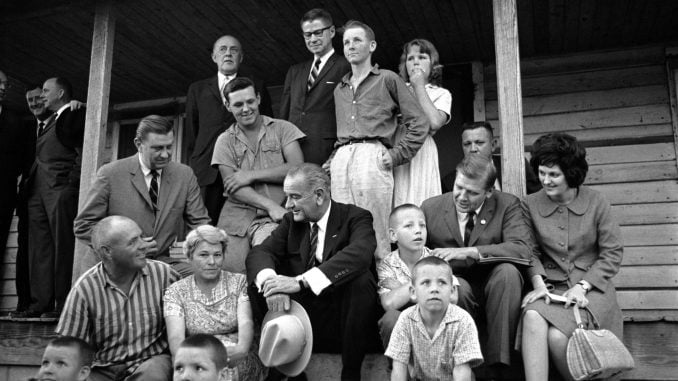
May 7, 1964
‘War on Poverty’ presidential visit
President Lyndon Johnson and N.C. Gov. Terry Sanford visited the home of tenant farmer William David Marlow near Rocky Mount as part of Johnson’s “War On Poverty” legislation tour. The 15-minute visit included a photo opportunity of Johnson with the family of 10 and essentially launched his tour of Appalachia. As show for visiting journalists and politicians, the family was told to hang a load of laundry on their clothesline and keep the children barefoot. Never thinking himself as poor, Marlow eventually wrote the president, “We have just found out that we are the joke of a whole nation.”
May 8, 1953
The ACC is born
A meeting between representatives of the Southern Conference in Greensboro resulted in the birth of the Atlantic Coast Conference. Initial members were Clemson, Duke, Maryland, North Carolina, North Carolina State, South Carolina and Wake Forest. Virginia was accepted later that year. Names like Dixie, Tobacco and Southern Seven were proposed but Eddie Cameron from Duke suggested the name that ultimately stuck.
May 10, 1949
Morehead Planetarium opens
The Morehead Planetarium located on Franklin Street in Chapel Hill opened as the first planetarium in the South and on a university campus. At the time, it was the sixth planetarium in the nation. The planetarium was a gift of John Motley Morehead III and supervised by Harvard astronomer Harlow Shapely. Architechts who worked on the Jefferson Memorial oversaw the project, which took 17 months and cost $3 million. During the 1950s to ’70s it was a hub of NASA’s astronaut training program. In 1973, an observatory with a telescope was added and in 1984 it became the first planetarium to use computer animation in its shows.
May 13, 1830
Birth of Zebulon Vance
Zebulon Baird Vance was born in Reems Creek in Buncombe County. Vance grew up in Asheville and studied at UNC Chapel Hill. During the Civil War, Vance, a popular colonel, was selected by the Conservative Party as candidate for governor in 1862. After an overwhelming victory, Vance who was just 32 at the time, became the youngest chief executive in state history. After launching his political career, Vance served as state senator, U.S. congressman and governor. Vance was well-known and well-liked for his personality and oratorical skills.
Source: North Carolina Department of Cultural and Natural Resources



